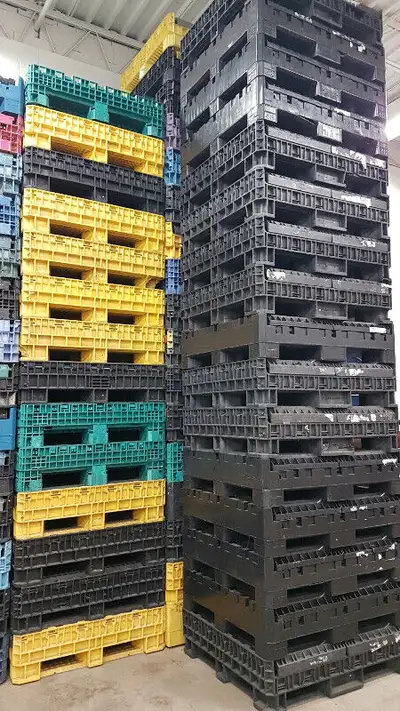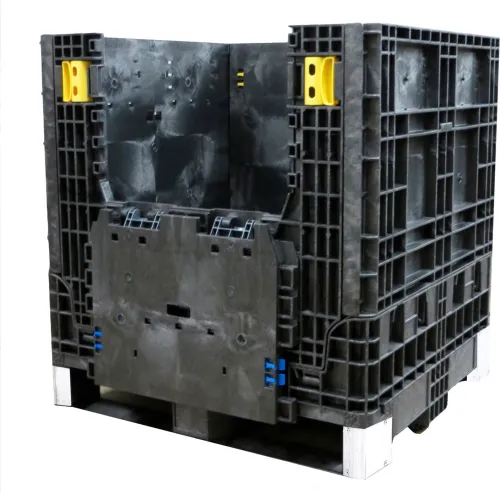Why Mass Containers Are Necessary for Sustainable and Cost-Effective Transport
Mass containers play an important function in modern logistics. They facilitate the effective motion of big amounts of products, consequently enhancing transportation procedures. This technique not only minimizes expenses however likewise lessens ecological impact with lower discharges and waste generation. As industries seek even more lasting practices, the adoption of mass containers is ending up being progressively considerable. What ramifications does this shift hold for future logistics and supply chain administration?
The Benefits of Making Use Of Bulk Containers in Logistics
Mass containers revolutionize logistics by enhancing effectiveness and sustainability. These containers enable the transportation of large quantities of products in a solitary trip, considerably minimizing the variety of journeys needed. This not only improves operations but also decreases labor prices related to handling, filling, and dumping. Furthermore, bulk containers are developed to optimize room use within transportation cars, guaranteeing that even more items can be shipped simultaneously.
The standardization of bulk containers also simplifies the logistics process. With uniform dimensions, they can be quickly stacked and kept, causing boosted warehouse administration. Furthermore, bulk containers commonly include long lasting products that safeguard contents from damages during transportation, consequently reducing product loss and increasing total integrity. As an outcome, organizations can experience improved supply chain performance, inevitably causing enhanced profitability and consumer satisfaction. This mix of elements makes mass containers an important property in modern logistics.
Ecological Impact: Lowering Waste and Carbon Footprint
As industries significantly prioritize sustainability, the fostering of bulk containers has actually become an essential approach for decreasing waste and decreasing carbon footprints. These containers decrease the use of packaging materials, such as boxes and plastic, therefore notably decreasing total waste generation. By consolidating shipments, mass containers boost transport efficiency, permitting more products to be delivered per trip. This reduction in journeys straight associates with lower greenhouse gas emissions, adding to a smaller sized carbon impact.
Mass containers can usually be reused or reused, further minimizing environmental influence. The toughness of these containers warranties they can withstand several transportation cycles, minimizing the requirement for single-use options. refurbished bulk containers. By enhancing logistics and promoting efficient resource usage, mass containers not only support sustainable practices however likewise motivate industries to line up with global environmental goals. Inevitably, their application mirrors a commitment to environmental stewardship and responsible resource management
Cost Cost Savings: How Mass Containers Lower Transport Costs
While numerous companies look for methods to boost their profits, the usage of mass containers offers a significant possibility for decreasing transport costs. Mass containers take full advantage of the volume of goods transferred, allowing businesses to ship bigger amounts at as soon as. This effectiveness reduces the variety of trips called for, directly lowering gas expenses and lessening labor expenses related to loading and unloading.
In addition, bulk containers usually feature streamlined styles that optimize area utilization within transport lorries. This implies less empty spaces, leading to a lot more efficient use readily available capability. Moreover, the longevity of bulk containers can reduce the threat of product damage throughout transit, reducing losses and making certain that even more goods arrive undamaged.
Enhancing Supply Chain Effectiveness With Bulk Storage Space Solutions
Bulk storage space remedies play a vital role in improving supply chain performance by optimizing stock administration. By settling goods into fewer, bigger containers, companies can considerably reduce dealing with prices connected with constant transfers and handling. This structured strategy enables far better monitoring and administration of stock, eventually causing enhanced operational performance.
Structured Inventory Management
Efficient stock administration is necessary for maximizing supply chain operations, particularly when organizations take on bulk storage space remedies. These remedies make it possible for businesses to maintain higher stock levels while reducing the frequency of replenishment. By consolidating materials into mass containers, firms can simplify their supply procedures, minimizing the complexity connected with tracking numerous smaller sized bundles. This approach facilitates exact stock matters and enhances forecasting precision, enabling for more enlightened decision-making. Additionally, bulk storage space services streamline storehouse organization, making it less complicated to situate and gain access to items when needed. Therefore, companies can attain a more reliable stock turn over rate, inevitably improving overall supply chain performance and lowering the possibility of stockouts or overstock scenarios.

Reduced Handling Expenses
The execution of mass storage space solutions not just enhances inventory management but also considerably minimizes taking care of expenses throughout the supply chain. By combining products right into mass containers, companies reduce the requirement for constant handling and transfer in between various storage and transport systems. This technique reduces labor costs connected with loading, discharging, and moving smaller sized plans. In addition, bulk storage decreases the regularity of deliveries, bring about lower transport prices and lowered gas intake. Therefore, businesses can maximize their logistics operations, permitting an extra reliable appropriation of sources. Inevitably, reduced handling costs add to improved general supply chain performance, cultivating a setting that sustains both sustainability and economic viability.

Adaptability of Mass Containers Throughout Various Industries
Lots of sectors have distinct requirements for transportation and storage space, mass containers have actually emerged as a versatile service that satisfies a vast array of needs. These containers, ranging from large containers to specialized storage tanks, can fit diverse materials, including liquids, powders, and granules. In the farming market, mass containers promote the transportation of grains and plant foods, while the food and drink market uses them for components and completed products. The chemical market depends on bulk containers for safely delivering unsafe materials, making certain compliance with safety and security policies. Furthermore, building companies gain from bulk containers for transporting accumulations and various other products. Their adaptability expands to different modes of transport, including trucks, trains, and ships, enhancing logistical performance. This convenience not just simplifies procedures across various fields however also advertises sustainability by decreasing packaging waste and optimizing room en route. As a result, bulk containers play an important duty in contemporary supply chain monitoring.
Future Patterns wholesale Container Usage and Sustainability
The future of mass container use is progressively formed by cutting-edge products development that enhances sustainability. Additionally, automation in logistics assures to improve procedures, minimizing waste and improving performance. Embracing round economic situation practices will certainly further change exactly how bulk containers are designed, utilized, and reused, fostering an extra sustainable transportation landscape.
Cutting-edge Materials Advancement
As industries progressively focus on learn the facts here now sustainability, innovative products growth wholesale containers arises as a considerable factor in improving environmentally friendly transport solutions. Researchers and suppliers are discovering biodegradable plastics, recycled composites, and lightweight steels to reduce environmental effect. These products not just minimize waste however likewise boost gas efficiency by lowering the overall weight of containers. Furthermore, advancements in wise materials, which can adapt to varying problems, boost the sturdiness and capability of mass containers. The assimilation of these innovative products aligns with circular economic situation principles, advertising reuse and recycling. As the demand for sustainable methods grows, the advancement of such materials will certainly play an important role fit the future of bulk container usage in logistics and transportation.
Automation in Logistics
Significant developments in automation are poised to change logistics and the application of bulk containers, improving sustainability in transportation. Automated systems, consisting of drones and independent automobiles, are improving the activity of mass containers, lowering the dependence on standard fuel-powered transportation. These modern technologies maximize transmitting and packing procedures, decreasing vacant miles and enhancing fuel effectiveness. In addition, automated supply monitoring systems boost tracking and tracking of mass containers, guaranteeing much better source allocation and lowered waste. The integration of the Internet of Points (IoT) enables real-time information analysis, allowing aggressive decision-making that lines up with sustainability objectives. As automation continues to develop, it is expected to drive better advancements wholesale container use, eventually sustaining more sustainable logistics methods and minimizing the environmental influence of transportation.
Circular Economy Practices
Developments in automation are establishing the stage for a much more integrated technique to circular economy practices in the domain name of bulk container use. As industries progressively embrace sustainability, bulk containers are being created for durability and reusability. This shift not only decreases waste yet also enhances source effectiveness. Companies are adopting approaches such as closed-loop systems, where used containers are accumulated, reconditioned, and reintroduced into the supply chain. In addition, wise modern technologies track container life cycles, facilitating much better management and decreasing ecological influence. The collaboration between producers, logistics carriers, and end-users is important in establishing standards for sustainable container use. used collapsible containers. Future fads suggest a growing focus on products that are recyclable and naturally degradable, more reinforcing the circular economic climate's principles wholesale transportation

Frequently Asked Concerns
What Materials Are Mass Containers Commonly Made From?
Mass containers are generally created from durable materials such as high-density polyethylene, cardboard, steel, and light weight aluminum. These materials supply adaptability, protection, and stamina, making them ideal for transferring different goods in different industries effectively.
How Do I Select the Right Dimension Bulk Container?
Selecting the right size bulk container includes assessing the quantity of materials to be delivered, thinking about taking care of tools compatibility, and appraising storage space requirements. Correct dimension assurances efficiency in transport and lessens waste throughout delivery.
Are Mass Containers Reusable or Recyclable?
Bulk containers are typically multiple-use, created for multiple trips, boosting sustainability. Many can likewise be recycled, depending on the products made use of. Selecting recyclable options even more minimizes and supports ecological goals waste in transportation practices.
What Safety Rules Apply to Bulk Container Transportation?
Security policies for mass container transport consist of compliance with the Department of Transportation guidelines, appropriate labeling of unsafe products, structural stability assessments, and adherence to weight limitations to ensure risk-free handling and protect against mishaps during transportation.
How Can Businesses Transition to Making Use Of Mass Containers Successfully?
Companies can change to bulk containers by examining current logistics, training team on handling, investing in ideal equipment, optimizing stock administration, and working together with providers to guarantee compatibility and efficiency throughout the supply chain.
As industries progressively focus on sustainability, the adoption of bulk containers has emerged as a key strategy for reducing waste and decreasing carbon impacts. By consolidating materials into bulk containers, firms can improve their inventory procedures, lowering the reference intricacy linked with tracking several smaller plans. As sectors significantly prioritize sustainability, cutting-edge products growth in mass containers arises as a significant aspect in boosting environment-friendly transportation remedies. Automated systems, consisting of drones and independent vehicles, are enhancing the activity of mass containers, minimizing the reliance on standard fuel-powered transport. In addition, automated i was reading this supply administration systems improve tracking and monitoring of bulk containers, guaranteeing far better source allowance and minimized waste.